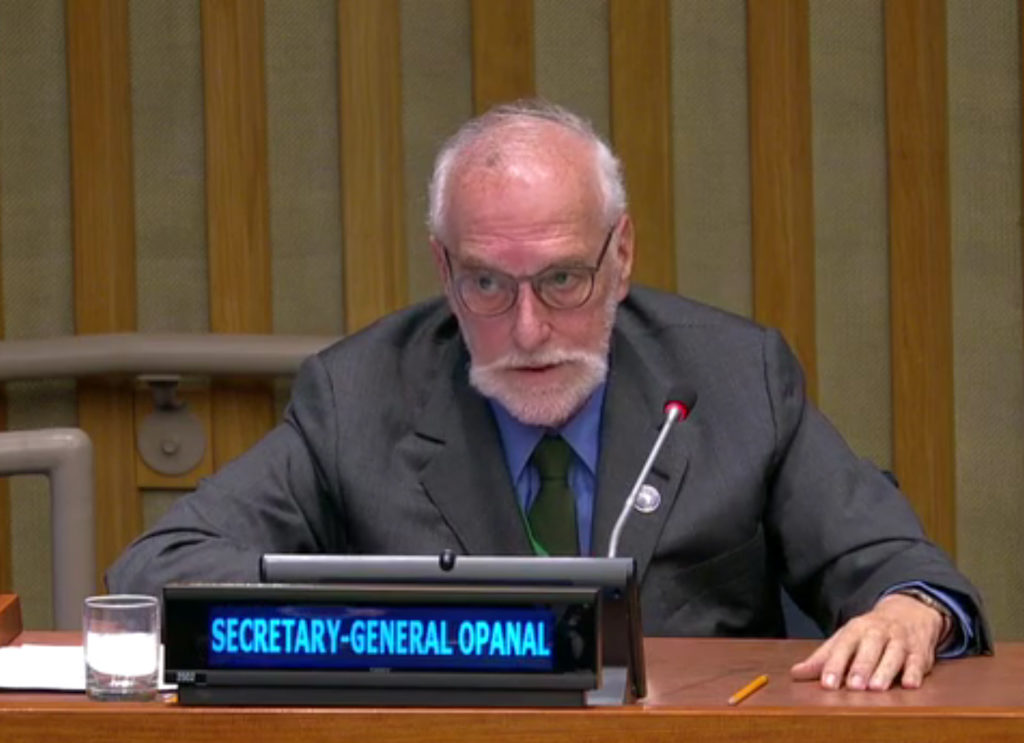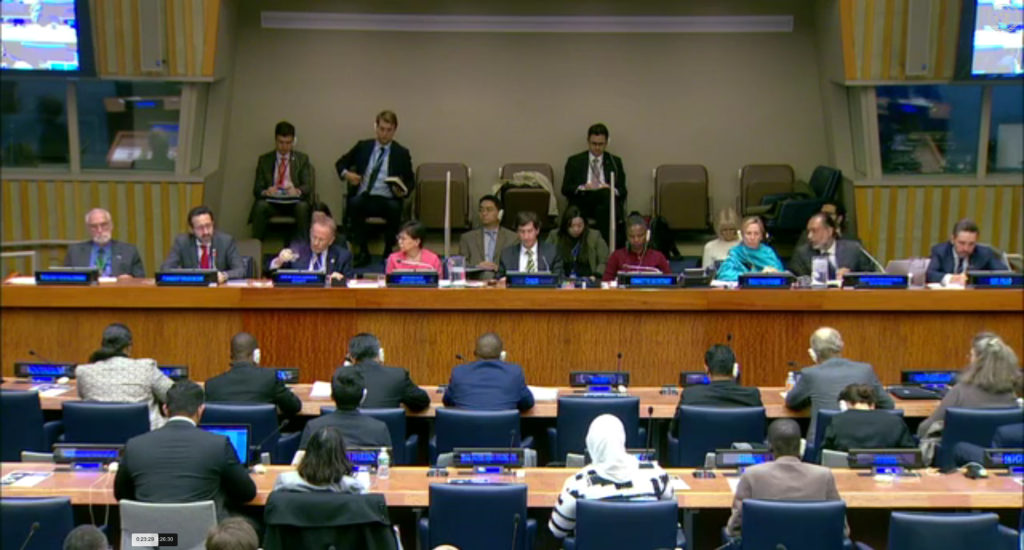
Ambassador Luiz Filipe de Macedo Soares, Secretary-General of OPANAL, during his participation in the High-Level Panel of the First Committee of the United Nations General Assembly.

From left to right: Ambassador Luiz Filipe de Macedo Soares (Secretary-General of OPANAL); Mr. Robert Mardini (Permanent Observer of the International Committee of the Red Cross to the United Nations); Mr. Michael Møller (Secretary-General of the Conference on Disarmament); Ms. Izumi Nakamitsu (Under-Secretary-General and United Nations High Representative for Disarmament Affairs); Mr. José de Castro Ataíde Amaral (Vice-President of the First Committee of the United Nations General Assembly); Ms. Sonia Elliott (Secretary of the First Committee); Ms. Renata Dwan (Director of the United Nations Institute for Disarmament Research); Mr. Amandeep Singh Gill (Executive Director of the High-Level Panel on Digital Cooperation); and Mr. Marc-André Franche (Officer in charge of the United Nations Peacebuilding Support Office).
On 17 October 2018, as part of his participation in the First Committee of the United Nations General Assembly, the Secretary-General of OPANAL participated in the High-Level Panel: Exchange with the High Representative for Disarmament Affairs and other High-Level Officers on "Current state of affairs in the field of arms control and disarmament". During his intervention, the Secretary-General mentioned ten points regarding the current situation on nuclear disarmament and non-proliferation, among them:
No se tiene noticia en la actualidad de que haya habido reducción cualquiera en los arsenales nucleares, que siguen conteniendo 14,465 ojivas, de las cuales cerca de 3,750 están emplazadas, según fuentes respetadas.
Nos encontramos en el segundo año del corriente ciclo de examen del Tratado sobre la No Proliferación de las Armas Nucleares (TNP). No podemos decir, desgraciadamente, que el II Comité Preparatorio haya sido bien sucedido, no solamente por la distancia entre las posiciones sino también porque no se ha podido indicar, hasta ahora, perspectivas claras de un buen resultado para la Conferencia de Examen de 2020.
Una amplia mayoría de los Estados Miembros de las Naciones Unidas mantiene su posición de repudio a las armas nucleares, lo que han afirmado de forma tanto política como jurídica. En ese sentido, no hay duda que se logran avances.
La reanudación de contactos sobre el problema de las armas nucleares en la Península Coreana, así como el inicio de algunas medidas concretas y la perspectiva de continuidad de conversaciones nos dan la esperanza de que se desarme ese factor de inseguridad no solamente regional pero de alcance mundial. Los auspiciosos hechos recientes nos permiten imaginar la posibilidad de creación de una zona libre de armas nucleares en la Península Coreana o, más allá, en el Noreste Asiático.
Las cinco zonas libres de armas nucleares – América Latina y el Caribe, Pacífico Sur, Sudeste Asiático, África, Asia Central, a las que se suma Mongolia – mantienen su vitalidad y su acción jurídica y política. Los 116 países que las componen están iniciando la preparación de una IV Conferencia de las Zonas Libres de Armas Nucleares en 2020, continuando el ciclo iniciado en 2005.
Hace algunos meses, tuvimos la muy positiva iniciativa del Secretario General Antônio Guterres, presentando el documento titulado “Asegurar nuestro futuro común – Una Agenda para el Desarme”, que viene en un momento crucial para servir de guía a los debates y acciones de la comunidad internacional.
Moreover, the Secretary-General made some comments on the contribution of nuclear-weapon-free zones to international and regional security:
Son ellas una creación del Derecho Internacional que se concreta con el Tratado de Tlatelolco, en 1967, y que constituye el primer paso para resolver el problema de las armas nucleares, puesto inicialmente por la primera resolución de la primera Asamblea General de las Naciones Unidas.
El OPANAL no es solamente el guardián de la Zona Libre de Armas Nucleares de América Latina y el Caribe. Es igualmente un instrumento para que sus Estados Miembros presenten posiciones conjuntas en los organismos internacionales y otros foros apropiados.
In the High-Level Panel also participated the Permanent Observer of the International Committee of the Red Cross to the United Nations; the Secretary-General of the Conference on Disarmament; the Under-Secretary-General and United Nations High Representative for Disarmament Affairs; the Director of the United Nations Institute for Disarmament Research; the Executive Director of the High-Level Panel on Digital Cooperation; and the Officer in charge of the United Nations Peacebuilding Support Office.
OPANAL, the sole international organization in the world entirely devoted to nuclear disarmament and non-proliferation, participates actively every year in the First Committee of the United Nations General Assembly. This is the second time the Secretary-General of OPANAL is invited to participate in the High-Level Panel.